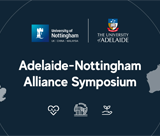
How past affects our present
May 31st, 2012
Charting the heritage of a local community can be a painstaking and frustrating process for the amateur historian or archaeologist, often hampered by limited time and funding.
Now, a new project being led by The University of Nottingham could offer a helping hand to East Midlands voluntary groups interested in delving into their local history by opening up access to the expertise and resources of professional arts and humanities researchers.
The Writing our History and Digging our Past project will allow local groups to work with researchers for six months investigating a specific archaeology or history topic and could increase their chances of attracting further funding to continue their studies in the future.
Professor Liz Harvey, Head of the School of Humanities, said: “We see this as a process of genuine knowledge exchange. It will offer our arts and humanities researchers valuable experience of public and community engagement while opening up access to knowledge and resources that in normal circumstances may be out of reach of voluntary groups and societies.”
The project is funded as part of the Arts and Humanities Research Council’s (AHRC) Connected Communities initiative, which aims to encourage understanding of the changing nature of communities and community values and the impact which their heritage and cultural contexts have on our quality of life.
The University has been awarded £25,000 by the initiative, £5,000 of which has been earmarked as a Challenge Fund specifically for community projects. The voluntary organisations will be able to join forces with a Nottingham academic to bid for a £500 grant which will fund a specific local heritage project for six months. The funding will also be used to deliver open days and workshops showcasing research excellence and to strengthen links with organisations including Derbyshire County Archives, local libraries, Yorkshire Archaeological Trust, the National Trust and Durban House, home to the DH Lawrence visitors’ centre.
Academics at the University already have longstanding relationships with local groups and work with volunteers on existing research projects, including:
• The Victoria County History (VCH), which aims to publish a concise history of every parish in England. Academics Professor John Beckett and Mr Philip Riden have been working with volunteers to research the history of Nottinghamshire and Derbyshire.
• John Player’s Advertising Archive Knowledge Transfer Partnership, in collaboration with Nottingham Museums and Galleries, which has catalogued a collection of more than 20,000 objects from the company’s history.
• Fieldwork in Southwell, which is combining a range of desk-based and archaeological survey techniques to examine how the area has developed since the Romans.
Dr Will Bowden, an academic lead on Fieldwork, said: “In Southwell, local volunteers work together with students in the excavation team and allow us to literally dig in their gardens, giving us the opportunity to map archaeological deposits across the town. The research simply could not happen without community involvement.”
Tags: Arts and Humanities Research Council’s (AHRC) Connected Communities i, community engagement, Dr Will Bowden, Durban House, Fieldwork, Head of the School of Humanities, John Player’s Advertising Archive Knowledge Transfer Partnership, Professor John Beckett, Professor Liz Harvey, The Victoria County History (VCH), Writing our History and Digging our Past
Leave a Reply
Other
Trusted Research update: changes to technologies requiring an export control licence
The UK Government has issued an updated UK Strategic Control List, introducing additional export control measures […]

Adelaide-Nottingham Alliance: join Vice-Chancellors at event celebrating global partnership
Staff, students and researchers are invited to join the Vice-Chancellors of the University of Nottingham and […]

